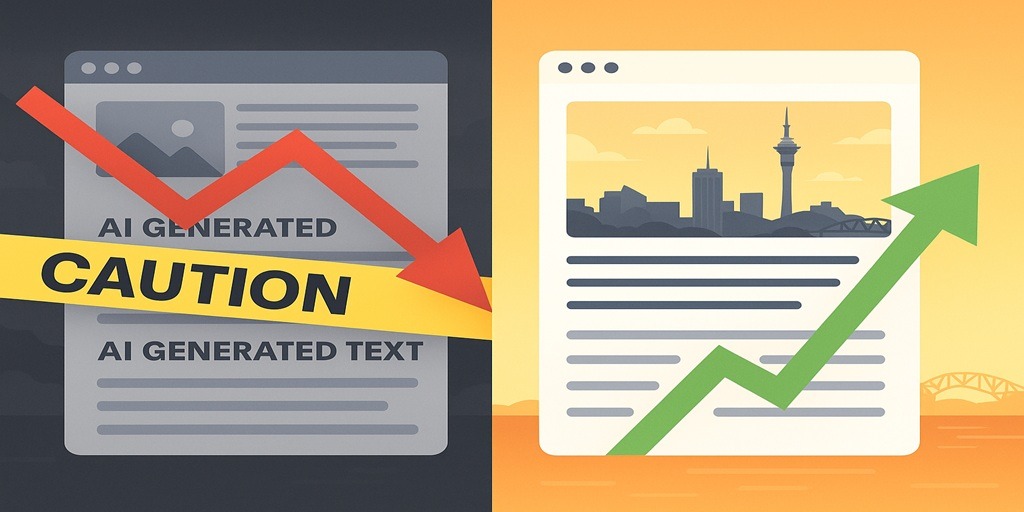Is AI Content Hurting Your Rankings? What We’re Seeing in Auckland Right Now

GET FREE INSTANT QUOTE
Introduction: Why This Conversation Is Everywhere
I can’t go a week without someone asking me: “Hey, is Google punishing sites that use AI content?” From small cafés in Ponsonby to e-commerce owners in South Auckland, the question is everywhere. And I get why. AI tools are producing words at a speed no human can match. But fast doesn’t equal effective — and that’s the bit too many businesses miss.
Over the past year, at Rank Phoenix we’ve had a front-row seat to how AI-generated content behaves in the wild. Sometimes it helps. Quite often, it backfires. The truth is sitting somewhere in the messy middle, and if you’re an Auckland business relying too heavily on these tools, you might already be seeing the warning signs.
Let’s break it down in plain English: what Google really thinks of AI writing, how it’s affecting local rankings, and the practical steps you can take right now to avoid slipping into obscurity.
What Does Google Actually Think About AI Writing?
Google doesn’t ban AI content. What it cares about is whether your content is helpful, original, and trustworthy.
Now here’s the nuance. Google’s E-E-A-T framework (Experience, Expertise, Authoritativeness, Trustworthiness) is at the heart of ranking decisions. When a piece of content feels like it could have been written by anyone, anywhere, it usually lacks those signals.
And trust me, Google’s systems are much sharper at picking up on “thin” content than they were even a year ago. We’ve seen sites shoot up with AI-heavy posts only to nosedive a few weeks later.
Are We Actually Seeing AI Content Hurt Rankings in Auckland?
Short answer: yes.
In the last six months, I’ve reviewed dozens of sites across Auckland — tradies, restaurants, accountants, online stores. The pattern is clear. Businesses that went all-in on AI writing often got an initial traffic spike. But three months later, many of those pages were either de-indexed or buried beyond page three.
Real Example From Our Desk
One local plumbing business in Glenfield thought publishing 30 AI-written blogs in a month would catapult them to the top. At first, impressions doubled. But calls? They stayed flat. Worse still, by the second Google update, half those pages had vanished. Why? The blogs sounded robotic, ignored local context, and didn’t answer customer intent. We rebuilt the content with case-based storytelling and location cues, and rankings recovered within 10 weeks.
Lesson learned: speed isn’t a substitute for strategy.
How Does Google “Spot” AI Content?
This is where most people get it wrong. Google isn’t sitting there with an AI detector tool like the ones you find online. What it does look for are patterns.
Quick Breakdown:
- Repetition: Sentences built in the same rhythm over and over.
- Shallow coverage: Questions half-answered with no real depth.
- Generic phrasing: Content that could apply anywhere, not Auckland specifically.
- Lack of expertise signals: No case studies, no stats, no lived experience.
- Low engagement: Users bounce quickly because it feels lifeless.
So yes, AI-only content often leaves fingerprints. But it’s not about “detecting AI” — it’s about detecting laziness.
How Can You Tell If AI Content Is Hurting Your Site?
Here are the red flags I tell my clients to watch for:
- Traffic drops right after bulk publishing.
- Bounce rates jump — visitors click, skim, and leave.
- Thin indexation — Google crawls your site but ignores large chunks.
- No snippets — you lose positions in “People Also Ask” or featured snippets you once owned.
- Reviews vs. rankings mismatch — customers love you, but your online visibility tanks.
If any of that rings true, there’s a decent chance your AI-heavy strategy is doing more harm than good.
When Does AI Content Actually Help?
Here’s the thing: I’m not anti-AI. I use it myself — just not in the way most people do. AI shines as a support tool, not the writer of record.
Best Uses for AI in SEO :
- Drafting outlines so you don’t start from a blank page.
- Speeding up meta description or title brainstorms.
- Generating content briefs for writers.
- Helping identify related questions or keyword gaps.
- Repurposing long-form content into shorter formats.
But when it comes to blogs, service pages, or case studies? Human input isn’t optional — it’s essential.
Is Human-Written Content Really Ranking Better in Auckland?
From what we’ve measured: yes, absolutely.
Sites that mix local storytelling, client experiences, and on-the-ground knowledge consistently outperform those with “copy-paste” AI text. For example, one North Shore electrician added case studies with before-and-after photos of wiring jobs. Those posts grabbed snippets almost instantly, while his AI-driven posts languished.
The difference wasn’t word count. It was trust signals. Google and customers alike can sniff out real experience.
Should You Delete All Your AI Content?
No. That would be overkill.
Don’t delete everything. Audit and improve. Keep what performs, rewrite what doesn’t.
The smarter play is to review your existing AI-assisted posts and ask: “Does this answer the query fully, or just halfway?” Add your expertise, anecdotes, and location context. Sometimes a 15-minute rewrite turns a flat article into one that wins Discover traffic.
Pros and Cons of AI Content
|
Pros |
Cons |
|
Quick to produce |
Generic tone and structure |
|
Cost-effective upfront |
High risk of long-term traffic decline |
|
Good for ideas & outlines |
Lacks lived expertise |
|
Helps scale repetitive content |
Often fails on local relevance |
Action Plan: How Auckland Businesses Should Handle AI Content
If you’re serious about protecting rankings, here’s the framework we use with clients:
Step 1. Audit Your Current Content
Run a quick scan. Which posts are driving traffic? Which ones are being ignored? Flag anything with high bounce or no impressions.
Step 2. Rewrite, Don’t Scrap
Don’t waste time deleting. Layer in local details, stories, or stats. Example: instead of “plumbing tips,” write “5 plumbing mistakes we see in Mt Eden homes.”
Step 3. Balance Speed With Substance
Yes, use AI to save time — but always add the human layer. Even one anecdote or photo from your business changes everything.
Step 4. Monitor Engagement, Not Just Rankings
Look beyond the SERPs. Are visitors staying longer? Are calls or bookings increasing? Google rewards what users love.
Step 5. Build a Long-Term Content Strategy
Content is an investment, not a checkbox. Mix evergreen guides, case studies, and timely updates. Avoid the temptation of pumping out 50 AI blogs in one go.
Frequently Asked Questions
1. Does Google penalize websites that use AI content for SEO?
Google doesn’t punish AI tools, but it does push down weak, generic writing that adds no value.
I’ve watched plenty of Auckland businesses try mass-publishing AI blogs. The problem isn’t the tool — it’s the lifeless content. When articles have no real examples, no expert angle, Google just buries them. Helpful, experience-based content survives. The penalty isn’t for “AI,” it’s for fluff.
2. Why is my Auckland business website losing traffic after publishing AI blogs?
Most AI blogs lack local detail, so customers leave quickly and rankings slide down.
One Ponsonby café owner asked why her traffic halved after uploading 25 AI blogs. The answer was simple: they didn’t mention Auckland life at all. No Sky Tower references, no weekend brunch habits. Locals spotted it instantly and bounced. We rewrote those posts with real stories, and traffic returned within weeks.
3. How can I tell if AI-generated content is hurting my rankings in 2025?
Watch for pages disappearing, impressions dropping, and visitors clicking off faster than usual.
When a Glenfield tradie came to us, half his AI blogs weren’t indexed. Google just ignored them. On top of that, bounce rates shot up. If you’re putting in effort but seeing fewer calls or leads, that’s usually the giveaway. AI without substance leaves footprints, and Google is quick to notice.
4. What is the best way to use AI tools for SEO without losing Google rankings?
Use AI for ideas, but rewrite with personal experience and Auckland-specific insight.
I sometimes draft with AI to avoid a blank page, but that’s where it ends. The ranking boost comes when you add local stories — like how foot traffic in Britomart differs from the Shore. Google spots the detail, readers trust it more, and that’s what wins. AI’s the helper, not the hero.
5. Can AI-written content ever rank on Google Discover or Featured Snippets?
Not unless it’s polished with visuals, direct answers, and human storytelling.
We tested this with a client in Mt Eden. AI churned out a “best cleaning tips” blog. It didn’t rank anywhere. When we rewrote with step-by-step advice, added photos from actual jobs, and kept answers punchy, suddenly it showed in snippets. Google’s picky. Content needs personality and clarity to earn that spot.
6. Is human-written SEO content still more effective than AI content in Auckland?
Yes — human content builds trust and converts better because it feels real.
A North Shore electrician shared a detailed job story on his site — wiring issues in a 1960s villa. That single post pulled in more calls than twenty AI blogs combined. Why? Because it felt authentic. Locals recognised the scenario, and Google did too. In this city, genuine human voice always cuts through the noise.
7. How do Auckland SEO agencies deal with Google updates and AI content risks?
Agencies here audit, refine, and rebuild weak content so updates don’t tank rankings.
When Google rolls out changes, we don’t panic. At Rank Phoenix, we check which pages dip, especially AI-heavy ones, and fix them with real stories, customer quotes, or local stats. A Manukau retailer dropped last update — after rewriting product blogs with local insight, traffic bounced back. Updates hurt shortcuts, not strong strategies.
8. Should I rewrite my old AI blogs to improve rankings in 2025?
Yes — refresh them with detail, local cues, and real expertise instead of deleting.
We worked with a Parnell fashion store that had 40 dull AI blogs sitting idle. We rewrote them with photos, customer experiences, and local event tie-ins. Within three months, those same posts pulled new traffic. Rewrites are faster, cheaper, and stronger than starting from scratch. Google loves fresh signals.
9. How long does it take to recover from AI content hurting Google rankings?
Most sites recover in 2–3 months if pages are fixed properly.
An Albany e-commerce site saw a 40% drop after relying on AI. We rebuilt product blogs with staff input and local photos. Within ten weeks, rankings returned. Some niches move slower, but quick action always pays off. The longer you leave weak content live, the harder recovery gets.
10. Where can I get an SEO audit in Auckland to check if AI content is harming my site?
Rank Phoenix offers local SEO audits that pinpoint if AI blogs are dragging you down.
We’ve audited dozens of Auckland sites in the past year, and AI issues show up constantly — thin blogs, low engagement, indexing gaps. Our team goes through each page, highlights problems, and maps a fix. A Mt Roskill tradie saw calls return once we cleaned his AI-heavy blog section. An audit clears the fog fast.
Conclusion: Where to From Here?
AI is here to stay. But so is Google’s mission to reward content that feels real. If you’re an Auckland business owner worried your rankings are slipping, the answer isn’t to banish AI. It’s to use it wisely — as a helper, not a replacement.
At Rank Phoenix, we’ve seen both sides: cafés, tradies, and shops that tanked by going all-AI, and others that flourished by blending AI efficiency with human experience. The difference always comes down to authenticity.


Rank Phoenix team
Rank Phoenix helps Auckland businesses grow online with proven SEO strategies, local search expertise, and result-driven digital marketing.
